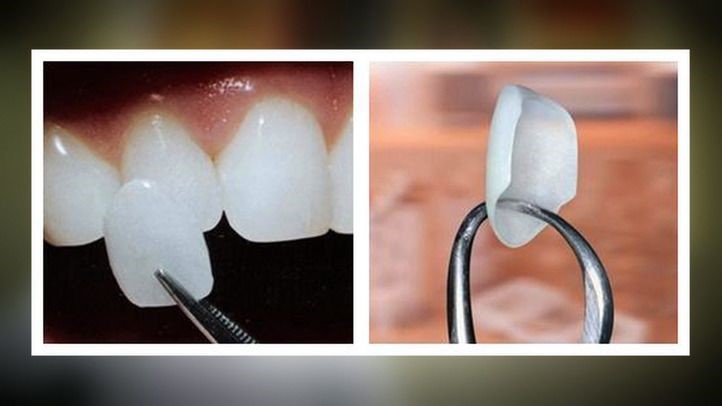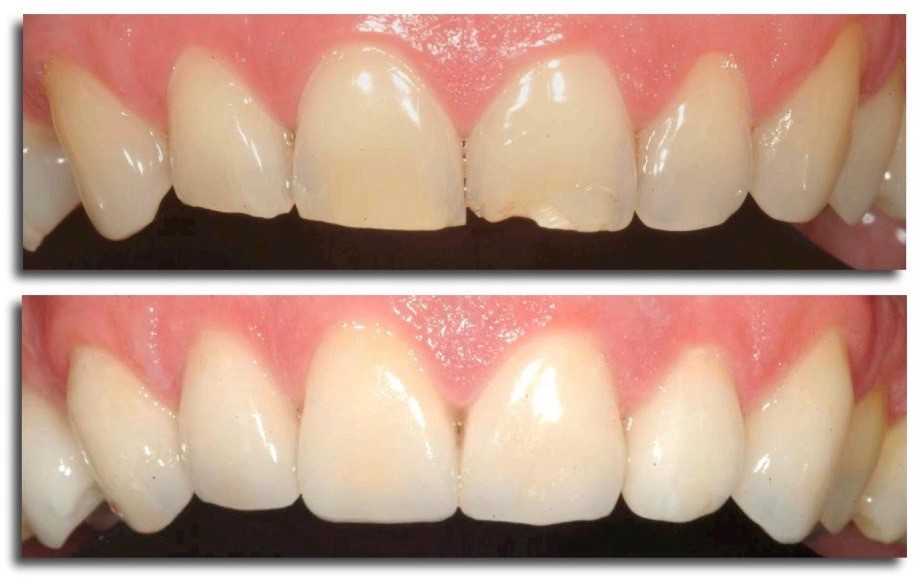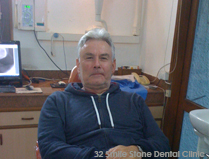Porcelain Dental Veneers

Smile makeovers or full mouth re-construction can involve one or more cosmetic dental treatments such as ceramic or porcelain dental veneers, dental implants for missing teeth, gingival re-contouring, teeth whitening and ceramic crown & bridges. There may also be a need to correct functional problems of bite, occlusion and TMJ along with the above procedures.
Porcelain or ceramic veneers cover the front surfaces of one or many teeth with thin shells of tooth like material. They serve both a functional and aesthetic role by protecting the surface of damaged teeth, and also help to reshape & whiten your smile. You may cover up one damaged tooth or revamp your entire smile with a set of porcelain veneers. Whether you have cracks, chips, worn enamel, or damaged tooth, porcelain veneers offer a convenient all-in-one solution for many dental problems simultaneously.
The porcelain material used for dental veneers imitate the translucent look of your natural teeth, hence you can expect a more youthful and a confident smile. Keep in mind that placing porcelain veneers is a non-reversible process since your dentist will need to reduce some part of your tooth structure to accommodate for the added thickness of the porcelain material.

Given below are some indications when veneers are required. They are needed to:
- Reshape distorted or misshapen teeth
- Cover slightly dark or dis-coloured teeth
- Close small gaps between teeth
- Repair chips or cracks on teeth
- Lengthen short, wide or uneven teeth
- Hide worn out enamel surface
- Straighten slightly crooked or overlapped teeth
Visiting your general or cosmetic dentist is the best way to assess whether placing veneers is the right treatment option for enhancing your smile. Typically, veneers are used for teeth which cannot be repaired by smaller restorations or fillings. Teeth which have lost most of their functionality or are severely decayed can only be supported by dental crowns.
- Initial Consultation: during an initial consultation, discuss your reason and interest for placing veneers, the steps involved, cost, number of veneers required and the kind of smile you wish to desire. Your dentist will assess your teeth and help you decide whether porcelain veneers are the best treatment option.
- Tooth Preparation: your dentist will need to reduce a small layer of tooth structure to make room for the thickness of veneer. Although each porcelain veneer is very thin, the amount of tooth reduction varies from case to case.
- Impression and Lab: next the shade, pictures, bite and impressions of the teeth are taken which are then sent to a lab for final fabrication. Each veneer is customized keeping in mind the final shape, size and colour of your smile. Temporaries are made during the time the lab is manufacturing the veneers.
- Final veneer bonding to tooth: finally the veneers are tried and if everything fits well and you are satisfied, the veneers are cemented to the tooth surface with special bonding kits.
While porcelain veneers are designed with quality materials to ensure longevity, they are not indestructible. Avoid biting or tearing into hard materials that might damage them such as nutshells, bones or ice. If you habitually grind your teeth at night, your dentist may advice you a protective appliance called ‘night guard’ to prevent your veneers from chipping. In all cases, good oral hygiene habits of brushing, flossing, and regular dentist visits will help maintain your oral health and extend the life of the veneers.
To learn more about porcelain veneers in Delhi or other general or cosmetic dental procedures, kindly book a consultation visit or email us.
Enquiry Form
Testimonials

Thank you for a painless dental experience. I can recommend your skill to anyone that requires dentistry......

Thank you so much for an efficient and professional treatment. Got a dental implant placed in her office.....





